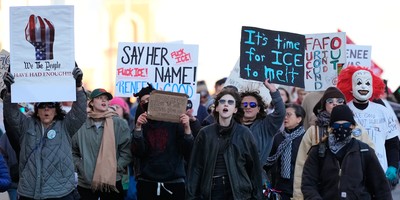Michael Moore is confused.
His new movie, "Capitalism: A Love Story," begins by suggesting that all was well until Ronald Reagan became president and cut the top 90 percent income tax rate. Everything was downhill from there.
But by the end of the movie, he says the problems really began in 1945, when Franklin Roosevelt died without enacting his proposed Second Bill of Rights, which would have "guaranteed' everything from a "remunerative job" and a "decent home" to "adequate medical care," a "good education" and "adequate protection from the economic fears of old age, sickness, accident and unemployment."

Adding to the confusion, he lavishes praise on Barack Obama and his "spread the wealth around" rhetoric. But Moore also demonizes as symbols of capitalism Clinton Treasury secretaries Robert Rubin (formerly of Goldman Sachs) and Lawrence Summers, and former New York Fed President Timothy Geithner without mentioning that Rubin has been Obama's adviser and that Summers and Geithner are, respectively, his chief economic guru and treasury secretary. Nor does he acknowledge that Obama continued the bailout policies of George W. Bush.
Moore declares capitalism evil, but he's never clear about what "capitalism" means. Considering how much time he spends documenting the cozy relationship between business and government, I thought he might mean "state capitalism."
But then he uses the term "free market" as a synonym for what he doesn't like.
What does the free market have to do with businesses manipulating government and strong-arming Congress for bailouts? Moore properly condemns both.
What does he want instead of "capitalism"? He's coy about that. Claiming that the public became increasingly curious about socialism once Obama was accused of favoring it, he goes to the only self-described socialist in Congress, Sen. Bernie Sanders, to ask for a definition. Socialism, Sanders tells Moore, means "the government represents the middle class and working class, not the wealth."
Recommended
Huh? That's socialism? It's not government ownership of the means of production and the abolition of private property and free exchange? Sanders reads Marx and Lenin very broadly. By his definition, I'm a socialist. I want government to represent the middle and working classes. Of course, Congress does that best by leaving them free, economically and otherwise.
Moore visits the National Archives to see if the Constitution establishes capitalism as the country's economic system. Seeing the words "people," "union" and "welfare" in the document, he says, "Sounds like that other ism."
That's just silly. The Constitution limits government's power to interfere with the people and their property. The Constitution is on the side of the free market.
Toward the end of the movie, Moore says capitalism is irredeemably evil and "has to be replaced." With what? I assumed he'd say socialism, but instead his answer is "democracy."
This apparently means expanding "hundreds of worker-owned businesses" in the United States.
But since workers are already free to start businesses, what's his point? A more astute observer would show how government intervention -- licenses, taxes, regulations -- inhibits such businesses.
Thankfully, I will soon have my own show on Fox Business Network to make such points. I'll invite Moore to come on as a guest.
For two hours, Moore rails against reckless banks and government bailouts, but never once mentions the government-business partnership that created the conditions for the turmoil. The fact that America no longer has a genuinely free market is the unnoticed 10,000-pound elephant in Moore's room.
Watching "Capitalism," you'd never know that the federal government colluded for decades with the financial, real estate and construction industries to divert resources into housing in the name of promoting home ownership -- even for people who couldn't afford it. You'd never know that Fannie Mae and Freddie Mac were, and are, privileged government-sponsored enterprises that encouraged shaky loans.
At least Moore has an inkling of what's wrong: cozy ties between Wall Street and government. Moore thinks the answer is better regulators or nationalization of banks. But his own evidence suggests that the real answer is a separation of state and economy -- stripping away Wall Street's privileges.
In other words: Limit government's power. Let the free market work.
























Join the conversation as a VIP Member